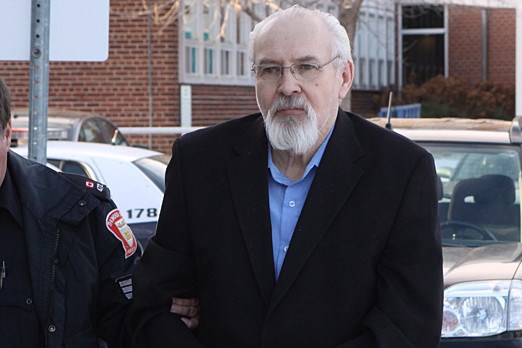Opposing lawyers at the trial for Michael Kelly posed two different questions for jurors to consider.
The final leg of the nearly three-week trial for Kelly started Wednesday at the Thunder Bay Superior Court. Kelly faces a first-degree murder charge in connection to the death of his former common-law partner Judie Thibault.
In order to make a case against Kelly, police staged a sting operation involving an insurance fraud scheme that would allegedly pay out $500,000. Two undercover police officers were involved. One officer played the role of a corrupt private investigator while the other was said to be a dying cancer patient.
Kelly was led to believe that both he and the ill man would benefit from the scheme.
The Crown and defence attorneys presented final submissions to the jury. Each posed a question for consideration.
Crown Dan Mitchell led off with his submission and requested the jury answer who killed Judie Thibault.
Mitchell asked that same question in his opening address.
The question was met with opposition from Justice John Wright who said the jury wasn’t there to investigate the murder, but give a verdict on the guilt or innocence of Kelly.
Mitchell carried on with his submission and said the Crown’s position was that Kelly intended to cause the death of Thibault and that the murder was planned and deliberate.
“(Kelly) took steps to ensure the execution of his plan by obtaining, loading and firing a weapon in (Thibault’s) head,” Mitchell said. “Then by disposing of her body in a location where it would not be easily found, by covering his tracks and his deeds with the smoke screen story that she was a missing person and playing along with the Thunder Bay police for years.
“The plan may not have been sophisticated; it may not have been complex, but it was nonetheless there and the fact that it took police almost nine years to finally catch up to Kelly using two undercover officers and an insurance fraud sting operation shows you just how effective Kelly’s plan was.”
Mitchell’s submission focused heavily on the undercover investigation where Kelly confessed that he had killed Thibault. Unknown to Kelly was the fact that the confession was being recorded, and that he was making it to an undercover officer.
It was during those taped conversations that Kelly showed his true side – an impulsive man with a violent streak, Mitchell said. The Crown also characterized Kelly as materialist and manipulative; a man who could charm his way through police interviews with his long-winded stories.
Kelly’s lawyer Gil Labine had a different question for the jury.
The question Labine wanted the jury to answer was whether Kelly lied to the undercover police to get the $500,000, or did he tell the truth during his confession?
“My responsibility as the person who protects the rights of Kelly is at an end and I pass that right to you,” Labine told the jury. “You will decide this case from what you’ve seen in this courtroom.
“I know it’s not easy to listen to witnesses and lawyers. What I’m saying is not evidence. What Mitchell said is not evidence. Nothing else is evidence except what you’ve seen in this courtroom.”
Labine pointed out that the Crown presented no forensic evidence directly linking Kelly to the crime.
He called the investigation of one officer “brutish” for the way he slapped a photo of the skeletal remains of Thibault on the windshield of Kelly’s car.
Labine also said the undercover operation hinged on what Kelly told the undercover officers. If Kelly gave those details of the murder that only the killer would know then the police would have their man.
But Labine said Kelly got most of the details wrong, and that much of the evidence police thought only the murderer could know was actually made public or already told to Kelly before the sting operation.
Labine showed several news releases and articles dating around 2004 that gave the rough location of where the body was found and how a news story even mentioned Wolf Lake Road being closed because of an investigation.
Labine went on to show the jury the same photo that the officer showed Kelly.
He said from that photo Kelly could have figured out where Thibault was shot and how the bullet didn’t go through the front of the skull, details police thought only the killer could know.
Labine added that Kelly never gave key details that the sting operation intended to collect, such as the coaxial TV cable used to tie up the body in the carpet.
Labine then went after the taped confession, reminding the jury that several videos had been played that showed Kelly continually denying that he killed Thibault.
“I didn’t do it but someone else did,” the court heard Kelly say in one video.
“I don’t know who did it it’s as simple as that,” he said in another.
Labine argued that the undercover officer wasn’t satisfied with the details Kelly was giving him and the only thing that would was a confession.
“(The undercover officer) makes it very clear that unless he says he did it then the scam wasn’t going down,” Labine said. “It’s not a small amount of money. It would mean a significant amount to a 63-year-old-man working in the bush.”
The judge has dismissed the jury until Thursday.
The trial is expected to resume on Thursday at 11 a.m.
